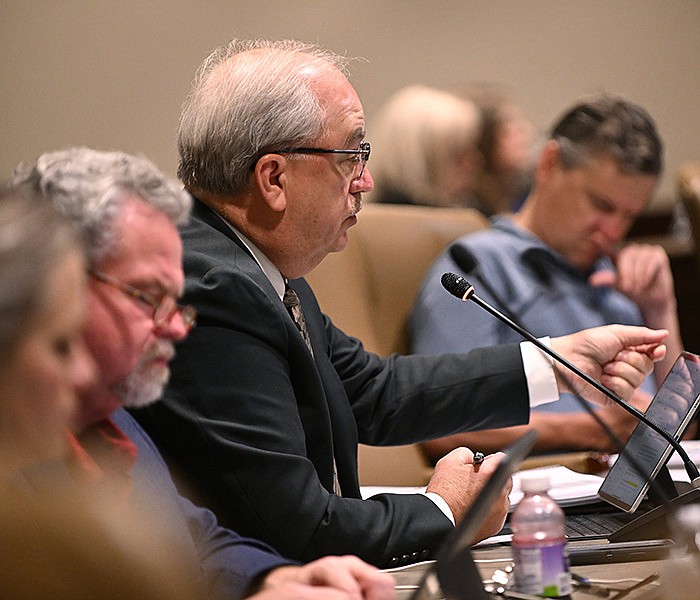A legislative audit of spending by Arkansas agencies during fiscal year 2022 cited $106 million in questioned costs.
The State of Arkansas Single Audit Report reviewed by the Legislative Joint Auditing Committee on Friday contained 45 findings, 12 of which are repeat findings indicating issues that have gone unfixed since the previous audit, said Melanie Doshier, who presented the report to lawmakers.
Auditors released unmodified or "clean" opinions for most of the major programs. Findings related to six programs resulted in qualified opinions, which are issued for instances of noncompliance auditors determined to be material, said Doshier.
Arkansas' Unemployment Insurance program, Emergency Rental Assistance program, the Coronavirus State and Local Fiscal Recovery Fund, Medicaid and Children's Health Insurance Program (CHIP) each received findings that resulted in qualified opinions.
More than $29.6 million in questioned costs came from the unemployment insurance program administered by the state Division of Workforce Services. The program, which was expanded due to the covid-19 pandemic, received three findings, one of which was a repeat finding, said Doshier.
During fiscal year 2022, the Division of Workforce Services identified 1,332 claims paid for Unemployment Insurance programs that were likely fraudulent. These claims totaled roughly $6.5 million, according to the audit report.
"Lack of appropriate internal controls resulted in overpayments of state and federal funds," auditors wrote in the report.
Officials with the Division of Workforce Services said in the report that the agency eased identity verification requirements due to an unprecedented volume of claims and health concerns during the coronavirus pandemic. The agency has since reinstated certain requirements.
Internal Audit has also created the Fraud Investigation Unit and hired additional staff to focus on investigating identity theft fraud claims, according to the report.
Hugh McDonald, secretary of the Department of Commerce, told lawmakers that the division has seen a significant decrease in improper payment rates for unemployment insurance since the height of the pandemic.
"We're making good improvements," he said. "We're going through an [unemployment insurance] modernization plan which will take a couple of years to do."
State Sen. Mark Johnson, R-Little Rock, said fraudsters had used his address to apply for unemployment benefits and questioned if any offenders had been prosecuted.
Charisse Childers, director of the division, said large fraud rings were responsible for many of the unemployment benefit fraud cases across the country. She noted that criminal cases in Arkansas brought against individuals have resulted in convictions.
"We are continuing to work with the Office of Inspector General at the federal level, also with the FBI and other law enforcement," she said.
Around 100 fraud cases are under investigation, McDonald said.
At least $5.8 million has been repaid in bad actor schemes since the beginning of the pandemic, Childers said.
Sen. Fred Love, D-Mabelvale, asked if bad actors might have access to his information since fraudsters had attempted to use his identity to file an unemployment claim.
Childers said everyone should be concerned about safeguarding their identity and encourage the use of security protection services.
Questioned costs for the Emergency Rental Assistance Program administered by the Arkansas Department of Human Services totaled more than $36.9 million. The agency received eight findings, one of which resulted in a qualified opinion. A review of quarterly reports revealed an overstatement of expenditures for one quarter in addition to errors in reports for two other quarters.
One of the findings noted that in fiscal year 2022 state officials identified $995,655 in fraud committed on behalf of beneficiaries of the Emergency Rental Assistance Program.
Mark White, chief of staff for the Department of Human Services, told lawmakers that the agency is addressing and referring criminal cases to prosecutors.
Seven findings at four agencies were issued in connection with the Coronavirus State and Local Fiscal Recovery Fund. The Department of Finance and Administration, the Department of Human Services and the Department of Health each received one finding. The Arkansas Economic Development Commission received four.
Two of the findings contributed to a qualified opinion. Questioned costs for the program totaled more than $203,000, said Doshier.
Six findings, three of which were repeat findings, affected both CHIP and Medicaid. The most significant deficiency, which contributed to a qualified opinion, noted that auditors were unable to determine if state officials had met a match requirement for federal awards. Questioned costs for these findings totaled roughly $383,000, said Doshier.
Four findings, two of which resulted in a qualified opinion, applied to CHIP. There were two repeat findings and questioned costs totaled more than $96,000, said Doshier.
An additional seven findings, four of which were repeat findings, applied only to Medicaid. Questioned costs for the program totaled around $41 million.
State agencies and state-supported institutions of higher education dispersed a total of $13.8 billion from 425 federal award programs during the 2022 fiscal year. The figure represents a roughly $182 million decrease from the amount disbursed during fiscal year 2021 when the state received more funding related to the covid-19 pandemic, said Doshier.
